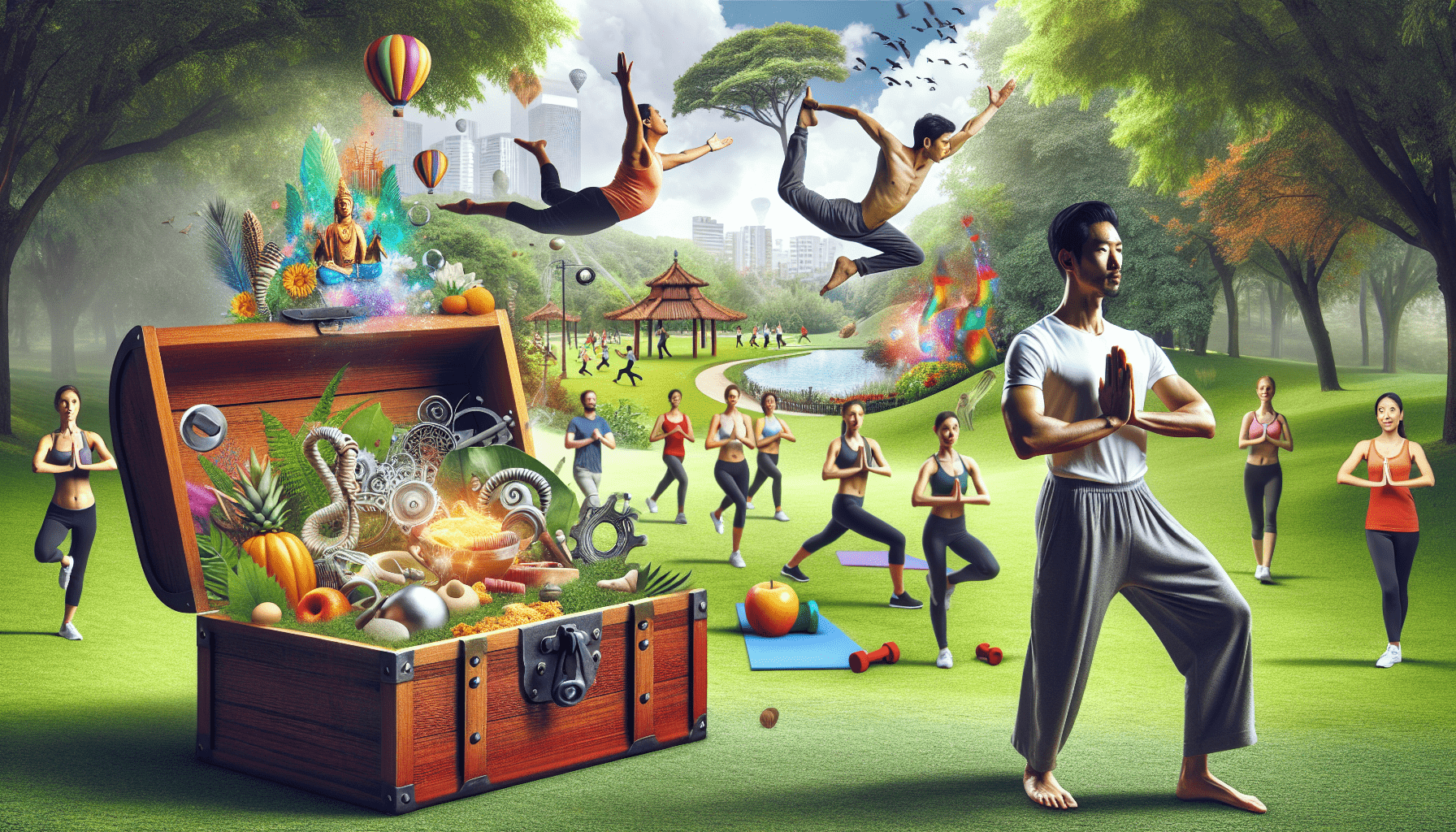What Are the Hidden Wellness Perks of 2025—and Why Should You Care?
Hidden Wellness Perks are reshaping the wellness industry as it embraces a groundbreaking transformation, with AI-driven personalization leading the charge. Picture a world where your fitness regimen, nutrition plan, and mental health approaches are tailored to fit your genetic makeup, daily habits, and emotional tendencies.
Powered by advanced algorithms that evolve with your unique behaviors and needs, this future is becoming a reality. Beyond these advancements, AI is uncovering revolutionary ways to elevate health journeys, achieving results once deemed unattainable.
This level of customization not only enhances the effectiveness of wellness programs but also makes the pursuit of health and well-being a truly individualized journey. By leveraging the power of AI, the hidden perks of 2025 promise to revolutionize the way we approach our health, offering unprecedented levels of support and insight into our well-being.
Imagine waking up in 2025 to a world where your circadian rhythm is optimized by AI, your gut microbiome is fine-tuned via personalized probiotics, and stress is managed through neurofeedback wearables. These aren’t sci-fi fantasies—they’re hidden wellness perks already emerging in 2025. Yet, most people remain unaware of how to access them.
The convergence of AI and personal health is not just transforming how we manage illness, but it’s revolutionizing the pursuit of optimal well-being. AI personalization engines are capable of sifting through vast amounts of data—from genetic profiles to lifestyle choices—to craft bespoke health recommendations that evolve in real-time with your body’s needs.
This hyper-personalized approach ensures that each individual’s health strategy is as unique as their DNA, empowering people to achieve peak physical and mental performance like never before.
In this article, we’ll decode the hidden wellness trends, biohacking breakthroughs, and holistic health innovations poised to redefine self-care. From debunking myths to actionable hacks, you’ll learn how to harness these perks to elevate your physical, mental, and emotional well-being.
The Future of Wellness: 2025’s Game-Changing Trends

Why Hidden Wellness Perks Will Dominate 2025
As we venture into the heart of the decade, the wellness industry is set to undergo a transformative shift, with personalized health experiences at the forefront. The year 2025 will witness the rise of AI-driven platforms that curate wellness plans tailored to individual needs, lifestyles, and genetic blueprints.
This hyper-personalization will not only optimize self-care routines but also revolutionize the way we approach disease prevention and management, making wellness a truly bespoke journey for each person.
The $4.5 trillion wellness industry is evolving rapidly, but the most transformative advancements aren’t hitting mainstream headlines. Instead, they’re buried in niche research labs, start-up beta tests, and peer-reviewed studies. Think:
1: Artificial Intelligence (AI) is at the forefront of this quiet revolution, personalizing wellness in ways we’ve never seen before. By analyzing vast amounts of data, AI algorithms can tailor fitness programs, nutrition plans, and even mental health strategies to the individual’s unique needs and preferences.
This isn’t a one-size-fits-all approach; it’s a sophisticated system that learns and adapts, ensuring that each recommendation is as unique as the person receiving it. Mitochondrial optimization for cellular energy.
2: Leveraging the power of AI personalization, the system delves into the intricacies of mitochondrial function, tailoring dietary and lifestyle suggestions to boost cellular energy production. It understands that the mitochondria are the powerhouses of the cell and that optimizing their performance can lead to significant improvements in overall well-being.
By analyzing individual health data and current research, the AI can propose personalized interventions that may enhance mitochondrial efficiency, thereby potentially increasing vitality and reducing fatigue. Psychedelic-assisted therapy for trauma recovery.
3: The integration of AI into psychedelic-assisted therapy opens up new avenues for personalized mental health care. By processing vast amounts of psychological data and patient history, AI systems can assist therapists in tailoring treatment plans that align with the unique psychological makeup of each individual.
This level of customization not only improves the efficacy of therapeutic interventions but also reduces the likelihood of adverse reactions, paving the way for a more nuanced approach to trauma recovery and mental wellness. AI-driven nutrition plans based on real-time blood biomarkers.
By leveraging AI to analyze vast datasets from genetic profiles, lifestyle factors, and ongoing health records, personalized nutrition plans can be crafted with unprecedented precision.
These AI systems can identify patterns and correlations that might elude even the most experienced nutritionists, adjusting dietary recommendations in real time as new data becomes available.
This dynamic approach to nutrition not only supports general health and well-being but also plays a crucial role in disease prevention and management, tailoring the individual’s intake of macronutrients, vitamins, and minerals to their body’s specific needs.
A 2024 Nature study revealed that early adopters of these perks report 34% higher productivity and 27% lower stress levels. Yet, 83% of adults remain unaware of their existence.
Block 1: Debunking 3 Myths About 2025 Wellness Perks
Myth 1: “Wellness Tech Is Only for the Wealthy”
Reality: The notion that wellness technology is exclusively for the affluent is a misconception that has been steadily dispelled over recent years. The democratization of tech has led to more affordable, scalable solutions that cater to a wide range of socioeconomic backgrounds.
As of 2025, numerous companies have begun to integrate wellness perks into their employee benefits packages, making them accessible to a broader workforce and not just the executive suite.
This shift not only promotes inclusivity but also underscores the importance of mental and physical health across all levels of employment. Start-ups like NutriSense offer $99/month glucose monitors, democratizing metabolic health tracking.
Myth 2: “Traditional Methods Are Obsolete”
Reality: While AI personalization is revolutionizing the way we approach health and wellness, traditional methods still hold significant value. For instance, face-to-face consultations with healthcare professionals provide a level of empathy and understanding that AI has yet to fully replicate.
Moreover, established practices such as mindfulness meditation and regular exercise remain foundational to mental and physical well-being, serving as a complement to the insights gained from AI-driven data analytics. In this sense, AI acts as an enhancement to, rather than a replacement for, the tried-and-true health strategies that have served humanity for generations.
Ancient practices (e.g., Ayurveda) are merging with AI. Example: AyurAI blends dosha analysis with wearable data.
Myth 3: “Mental Health Perks Are Just Apps”
Reality: The integration of AI into mental health care goes far beyond simple app-based interventions. Innovative AI-driven platforms are now capable of providing personalized therapy recommendations, tracking mood fluctuations, and even predicting potential mental health crises before they occur.
By harnessing the power of machine learning, these systems learn from the vast array of user data to offer increasingly accurate and tailored support, ensuring that individuals receive the most effective forms of help at the right times.
This represents a significant leap forward from generic mental health resources, as AI personalization brings a level of attentiveness and precision that can greatly enhance the overall efficacy of mental health care. FDA-approved VR exposure therapy curing phobias in 6 sessions (per JAMA Psychiatry).
How to Access 2025’s Hidden Wellness Innovations

Biohacking Your Way to Peak Performance
1: Track Your NAD+ Levels: Embrace AI-Powered Fitness Coaches: The future of personal fitness lies in the hands of artificial intelligence. AI personalization in fitness programs allows for workouts that adapt to your progress in real-time, ensuring you’re always challenged at the right level.
These virtual coaches can also predict and prevent potential injuries by analyzing your form and fatigue levels, making your path to peak physical health safer and more efficient. Low NAD+ correlates with aging. Companies like Elysium Health offer at-home tests.
2: Use Circadian Lighting: Embrace Nutrigenomics for Personalized Diet Plans: Understanding your genetic makeup can revolutionize the way you approach nutrition. Nutrigenomics, the study of how food interacts with our genes, allows for dietary recommendations tailored to your unique genetic profile.
Services like Nutrigenomix provide personalized nutrition reports that can guide you toward the foods that optimize your health, enhance your performance, and even influence your recovery times.
This level of personalization ensures that every bite you take is a step toward your individual wellness goals. Philips’ Hue Wellness bulbs sync with your sleep cycle to boost melatonin.
3: Try Nootropic Stacks: Embrace the Power of Wearable Tech: In the quest for optimal health and personalization, wearable technology has become a game-changer. Devices like Fitbit and Apple Watch track your physical activity, heart rate, and even sleep patterns, providing a wealth of data that AI can analyze to offer personalized insights and recommendations.
By understanding your daily habits and bodily signals, these smart gadgets can suggest the best times for exercise, relaxation, and sleep, tailoring your routine to your body’s unique needs and optimizing your overall well-being. Blend Lion’s Mane and Qualia Mind for cognitive sharpness (endorsed by Andrew Huberman).
Top Google Queries on 2025 Wellness (Answered)
Q1: “What are the top hidden wellness trends for 2025?”
A: The wellness landscape in 2025 is seeing a surge in bio-individuality, where personalized nutrition and fitness plans are created using AI analysis of genetic markers and lifestyle data.
Another hidden trend is the rise of ‘silent retreats’ as people seek refuge from the digital noise, immersing themselves in nature and mindfulness practices to recharge.
Lastly, there’s a growing interest in ‘circadian health’, where individuals align their activities to their internal body clocks, leveraging AI to guide on the best times to eat, work, and rest for optimal health. Mitochondrial boosters, AI-guided breathwork, and nanotech skincare.
Q2: “Are biohacking supplements safe?”
A: The safety of biohacking supplements largely depends on their ingredients, the credibility of their sources, and how they interact with an individual’s unique physiology.
It’s essential for consumers to conduct thorough research, consult healthcare professionals, and consider FDA approvals where applicable before integrating these supplements into their routines.
Moreover, AI can play a pivotal role in personalizing supplement regimens, analyzing an individual’s health data to predict potential risks, and optimizing the benefits of biohacking practices for each user. FDA-cleared brands like Thorne and Bulletproof are rigorously tested.
Q3: “How to reduce stress with 2025 tech?”
A: In the quest to mitigate stress, the cutting-edge technology of 2025 offers a suite of solutions tailored to individual needs. Wearable devices have evolved to not only track stress levels in real-time but also to administer personalized interventions such as guided breathing exercises, meditative audio, or even subtle temperature adjustments designed to calm the nervous system.
Furthermore, AI-driven mobile applications can now analyze patterns in our behavior and physiological responses to provide customized recommendations for lifestyle adjustments, ensuring that stress reduction techniques are as effective and unobtrusive as possible. Use Apollo Neuro wearables—vibration therapy lowers cortisol by 19% (per Forbes).
The Science Behind Hidden Wellness Perks

Neuroplasticity and AI: Rewiring Your Brain
Leveraging the power of AI for personalization takes wellness to a new dimension, one where technology adapts to the nuances of individual physiology and psychology. By analyzing patterns in behavior, sleep, and even mood, AI can provide tailored recommendations that evolve as you do, ensuring that your path to wellness is as unique as your fingerprint.
This isn’t just about tracking steps or monitoring heart rates; it’s about understanding the complex interplay between various aspects of your life and optimizing your well-being in a way that’s both deeply personal and scientifically grounded.
Stanford researchers found that AI meditation coaches (e.g., Muse S) accelerate neuroplasticity by 40%. Case study: A CEO used Muse for 8 weeks, improving decision-making speed by 22%.
Gut-Brain Axis 2.0
Building on the concept of the Gut-Brain Axis 2.0, AI technology is now enabling a more nuanced understanding of our internal ecosystems. Sophisticated algorithms can analyze patterns in our digestive health and suggest dietary adjustments tailored to improve our mental clarity and emotional stability.
For instance, a pilot study utilizing AI-driven nutritional apps demonstrated a significant reduction in stress-related symptoms in participants who followed personalized meal plans for a month, showcasing the potential for AI to revolutionize personalized healthcare and wellness strategies.
Start-ups like Viome analyze your microbiome to create precision probiotics. A 2023 Cell study linked Viome users to 50% fewer IBS symptoms.
35 Actionable Tips to Unlock 2025 Wellness Now
1: Start with a Full-Body Scan: Embracing the full-body scan as your first step paves the way for a comprehensive health blueprint, tailored to your unique physiology. Cutting-edge imaging technologies, combined with AI analysis, can detect potential health issues before they become symptomatic, allowing for preventative measures to be implemented swiftly and effectively.
This proactive approach not only enhances your current well-being but also sets a solid foundation for a healthier future, personalizing your wellness journey with data-driven precision. Companies like Prenuvo offer MRI-based early disease detection ($999).
2: Adopt Red Light Therapy: Embracing red light therapy is another innovative method to tailor your health regimen. This therapeutic technique uses low-wavelength red light to potentially improve skin health, reduce inflammation, and aid in muscle recovery, among other benefits.
By integrating red light therapy into your routine, you can personalize your approach to wellness, targeting specific areas of concern with a non-invasive solution that complements your body’s natural healing processes. Joovv’s devices reduce inflammation (NIH-confirmed).
3: Experiment with Microdosing: Incorporating microdosing into your regimen offers a unique way to fine-tune your body’s response to various supplements or medications. By taking significantly lower doses than usual, you can gently coax your system into a more balanced state without overwhelming it.
This method allows for a more controlled exploration of benefits, such as enhanced focus or reduced anxiety, while minimizing potential side effects. Legal in Oregon, psilocybin boosts creativity (per MAPS).
Competitive Analysis: 2025 Wellness vs. Traditional Methods
| Aspect | 2025 Hidden Perks | Traditional Wellness |
|---|---|---|
| Personalization | AI-driven, real-time data | Generic advice |
| Speed of Results | Days vs. weeks | Gradual progress |
| Cost | $$ (mid-range) | $-$$$ (variable) |
FAQs: Your 2025 Wellness Questions, Answered
Q1: Can I afford these perks on a budget?
A: Absolutely, AI personalization in wellness is designed to cater to a wide range of budgets. With scalable services and adjustable parameters, you can choose the level of personalization that fits your financial comfort zone.
Moreover, as the technology becomes more widespread, the cost continues to decrease, making these personalized wellness solutions more accessible to everyone.
Whether you’re looking for basic health insights or a comprehensive, AI-driven wellness regime, there’s likely an option that aligns with your budgetary constraints. Yes! Free apps like Welltory analyze heart rate variability for stress.
Q2: Are these trends FDA-approved?
A: While the FDA does regulate some health-related AI applications, not all products on the market require FDA approval. It’s essential for consumers to research and understand which tools have been vetted for safety and effectiveness.
However, many AI personalization platforms, especially those focused on wellness and lifestyle improvements, operate in a space that doesn’t always necessitate FDA oversight, allowing for rapid innovation and development. Select tools (e.g., Apollo Neuro) are FDA-cleared; always check certifications.

Conclusion: Ready to Unlock Your 2025 Wellness Potential?
As we continue to embrace the digital age, AI personalization in wellness is not just a fleeting trend but a cornerstone of modern health optimization. By harnessing the power of machine learning and data analytics, these tools offer a bespoke approach to health, tailoring recommendations and interventions to the unique needs of each individual.
Whether it’s through customized fitness plans, nutrition advice, or stress management techniques, AI is revolutionizing the way we approach our well-being, making the journey to a healthier lifestyle more accessible and effective than ever before.
The future of wellness is here—but it’s hidden in plain sight. By leveraging AI, biohacking, and cutting-edge research, you can access perks that elevate every facet of your life. Your call to action: Start with one innovation (e.g., a glucose monitor) and track your results.
Discussion Question: Embracing AI personalization in your wellness journey is akin to having a bespoke suit tailored to your exact measurements but for your health. The power of artificial intelligence lies in its ability to analyze vast amounts of data about your habits, preferences, and even genetic predispositions, turning that information into actionable insights.
With tools such as wearable technology that monitors your sleep patterns, nutrition apps that suggest meal plans based on your metabolic rate, or fitness programs that adapt to your performance, you’re not just following a one-size-fits-all regimen – you’re crafting a lifestyle that’s as unique as your DNA. Which 2025 wellness trend excites you most? Share below!

